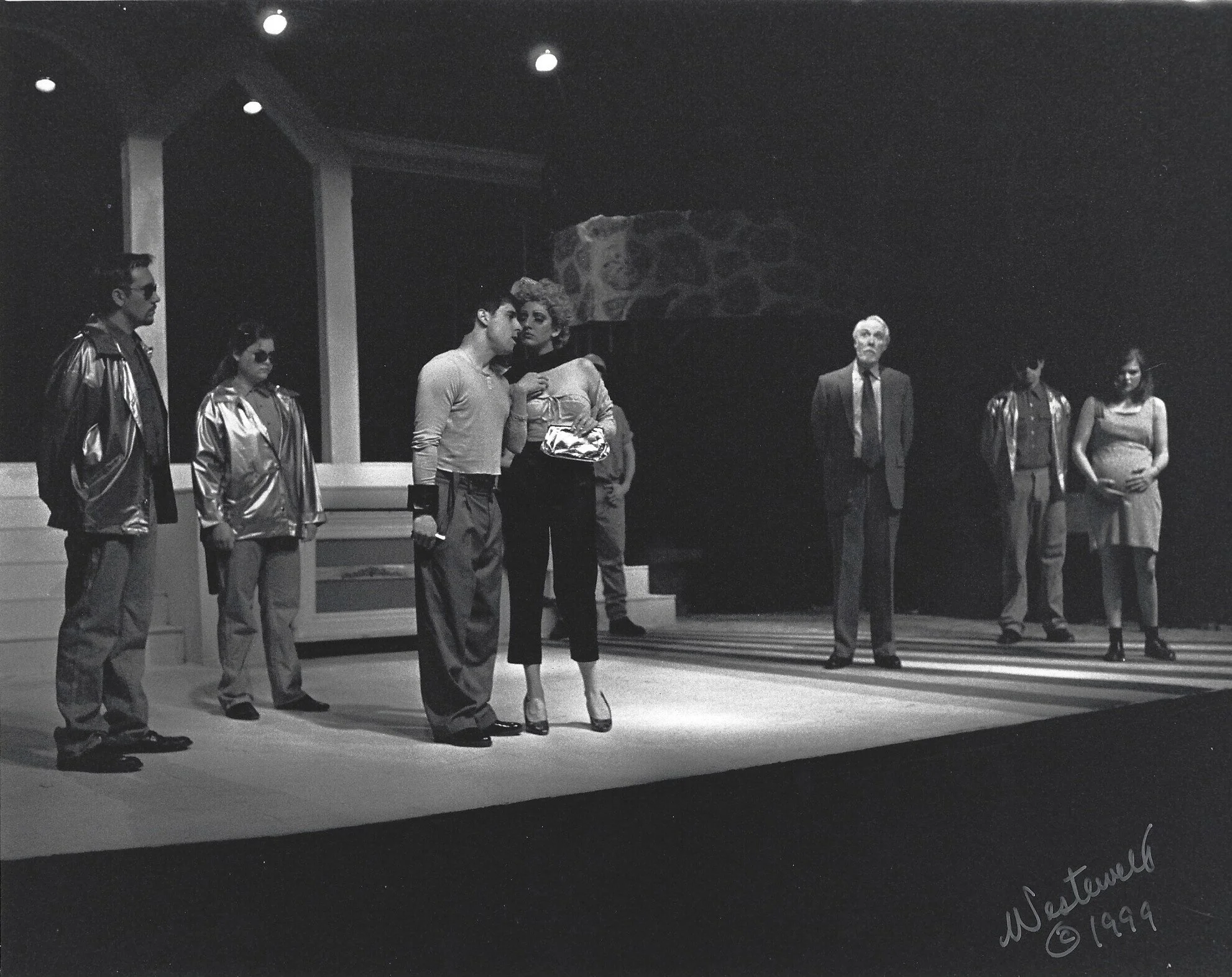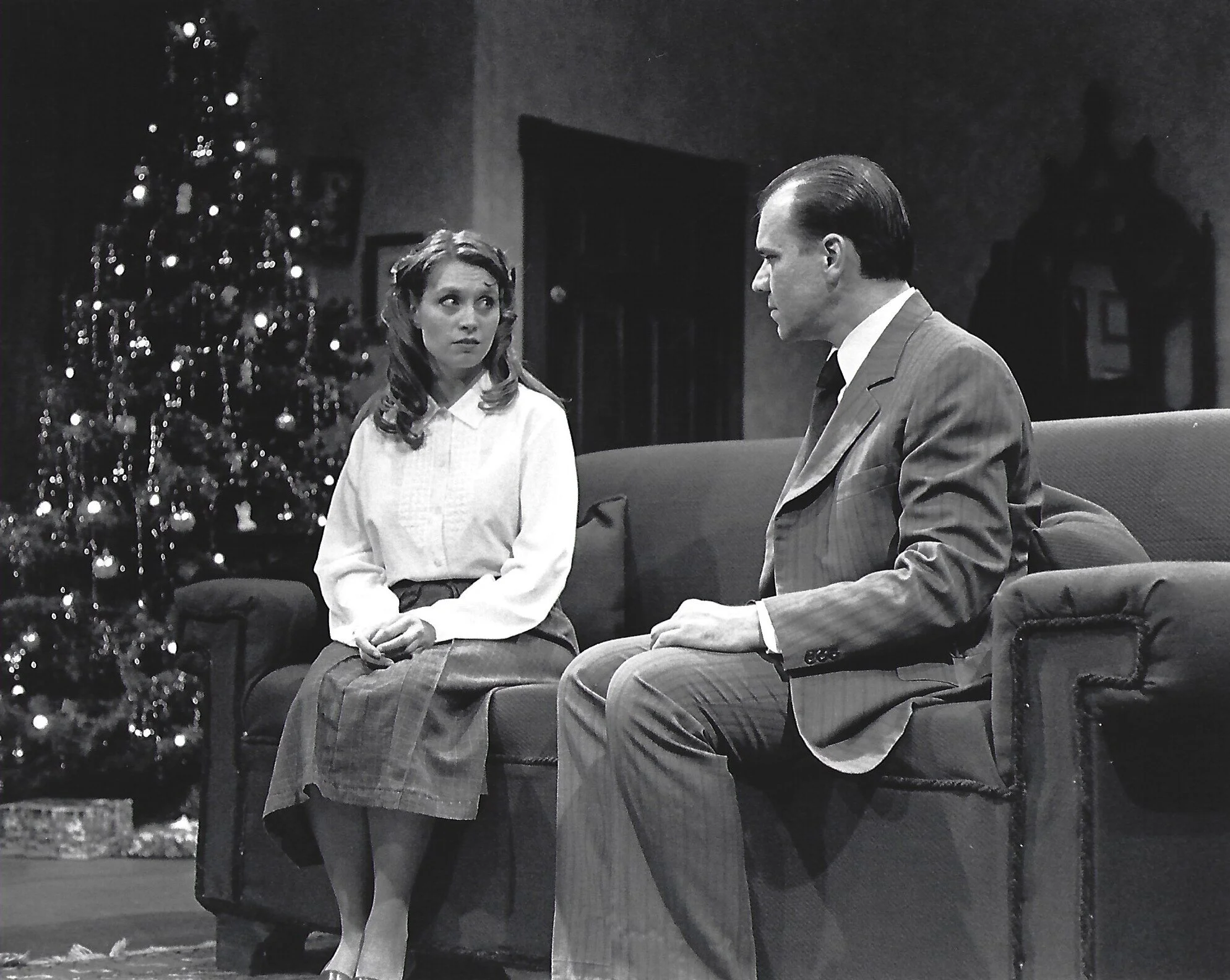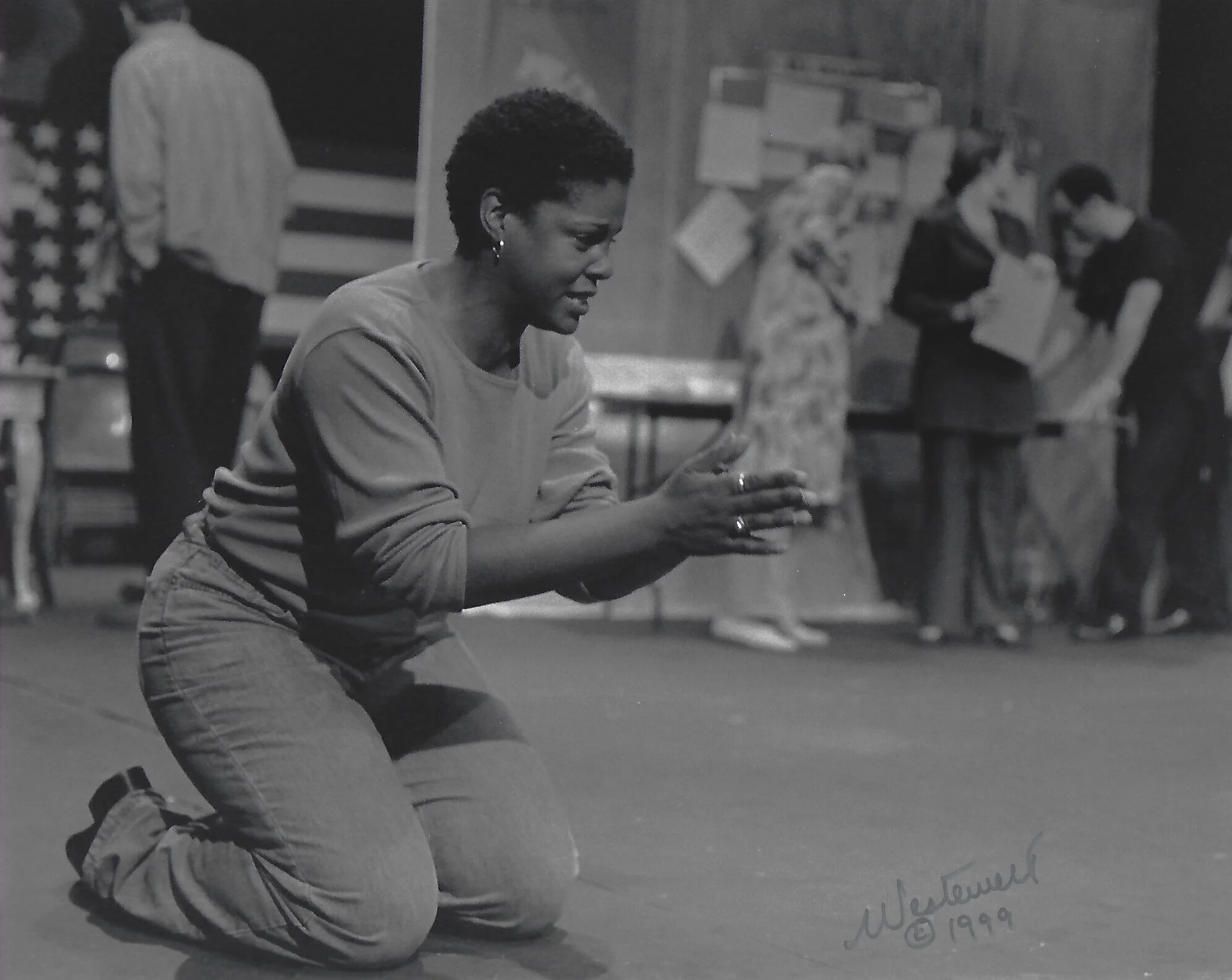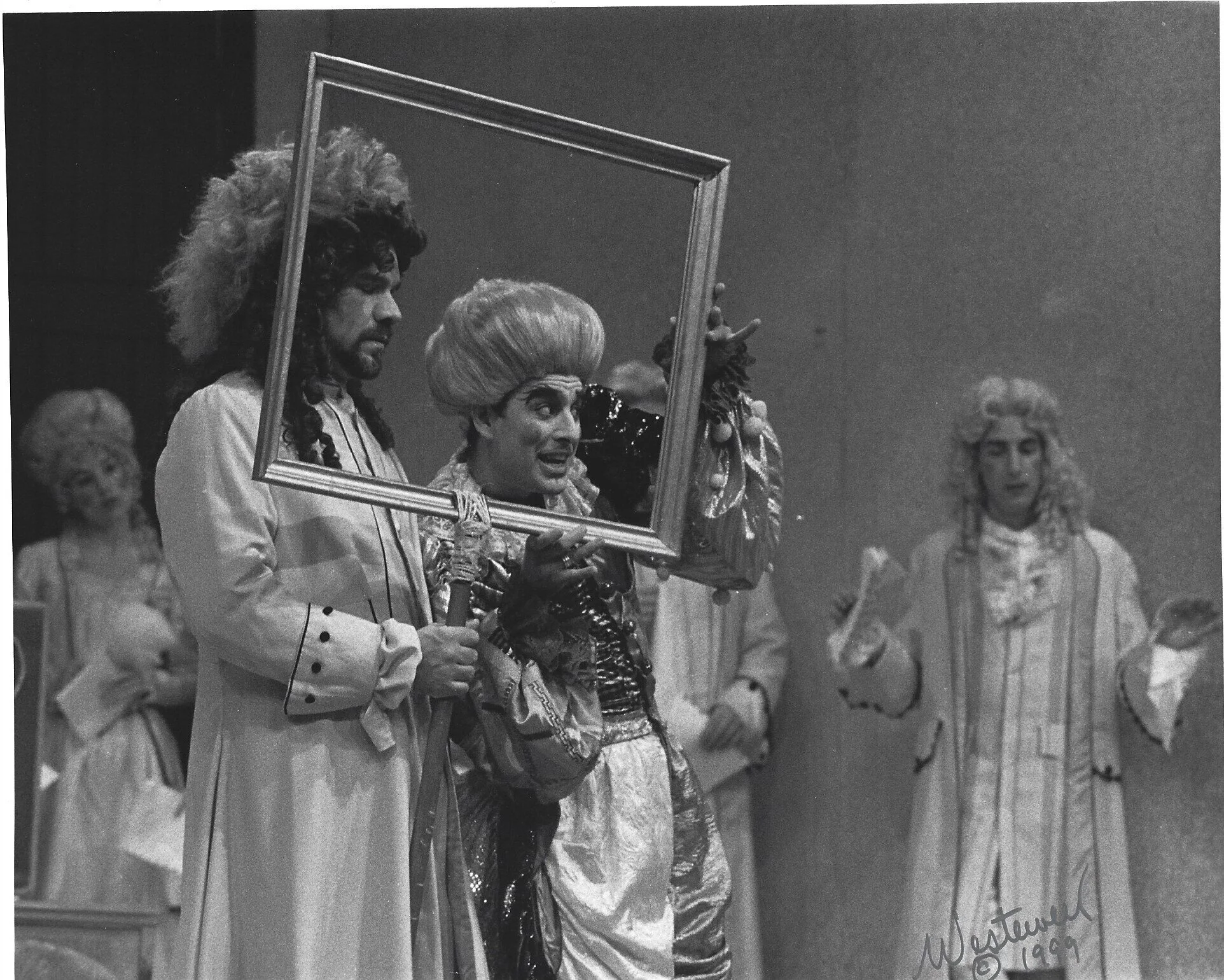Warner Crocker: 1999
In December of 1998, an announcement was made that Warner Crocker had been named as the new Artistic Director of Wayside Theatre. “Mr Crocker was selected by a Search Committee of the Board who received 50 submissions for the position that has been held by Christopher Owens for the past twelve years” (Wayside Theatre Press Release. 4 Dec. 1998). (Note: An un-named source states there were only two applicants). A native of Virginia and a graduate of James Madison University in Harrisonburg, Crocker was no stranger to the area. When he officially began his job as Wayside’s new Artistic Director, “he hit the ground running, when he came to work the first week in January” (McCarty, Linda. “Wayside Theatre Enters ….” TWS. 17 Feb. 1999).
Upon his arrival, Crocker announced the 1999 season and indicated he was becoming acquainted with the staff and the Theatre’s procedures. The usual pre-season audition schedule for actors was kept, and many local and DC actors participated in the one held in Middletown. Crocker also employed many actors with whom he had worked in Chicago for the season. He maintained the Theatre staff that had served for several years to assure a smooth transition. This included: Kay Edens, Box Office Manager, Sharon Gochenour as Business Manager, and Donna Johnson as General Manager. However, the continued employment of these long-time staff members was short lived and, after a year or so, new people were hired for these posts.
Pre-season activities continued. The Theatre’s files contain a copy of a press release announcing an early Valentine’s Day observance scheduled for February 6, 1999. This fund raiser, gala event billed as “The Season of Love and Lovers” was to begin with champagne and sweets in the Curtain Call and conclude with a presentation on the main stage by the choral ensemble, Winchester Musica Viva. Their twenty-five minute program contained music set to Shakespeare texts along with works by George Gershwin. Proceeds were to be divided between Musica Viva and Wayside Theatre. This event appears to be the only time an established choral ensemble ever performed at Wayside.
Another pre-season event took place on March 1, 1999. For this, Crocker sent a letter to local theatre ‘practitioners,’ announcing “a casual get acquainted meeting at the Theatre beginning at 7:00 p.m.” It was hoped that this meeting would be less formal and stressful than an audition, yet would provide opportunity to ‘meet the new guy in town.’ To promote this event, a circular was distributed to interested people to “come as you are; find out about the 1999 season; bring a picture and resume; have some fun” and were urged to RSVP no later than February 25 (“Meet the Artistic Director.” Flier. 1999).
The Theatre also hosted the 2nd Annual Bluegrass Benefit with performances scheduled for March 5 and 6, 1999, at 7:00 p.m. The performing ensemble was The Lynn Morris Band along with special guests Red & Murphy and New Liberty. These groups had performed the previous February for a similar benefit which was sold out in advance. All proceeds from the program were to go to the Theatre.
Sometime in May, the Theatre announced a new program, Community Nights at Wayside. This sales pitch was designed to encourage community involvement in the Theatre’s productions with a $2.00 reduction per ticket to members of neighboring communities provided they would purchase a ticket and attend a performance on a particular night. The schedule for this price reduction proposal was:
Wednesday, June 2 – Middletown
Thursday, June 3 – Strasburg
Friday, June 4 – Front Royal
Wednesday, June 9 – Stephens City
Thursday, June 10 – Winchester
Friday, June 11 - Woodstock
This ‘lure’ was applied for the first two shows of the season. There are no records that indicate whether this was a successful boost for ticket sales, or if it were continued beyond the first two shows of the 1999 season (“Community Nights at Wayside.” Wayside Theatre Facts. 19 May 1999).
Measure for Measure. May 27 - June 12, 1999. Scott Ruble (L), Cheyanne Racey, Robert LaPorta, Lesley Bevan, James Laster, Robert Branch, Stephanie Shelfer.
The season began with the usual opening night reception at the Wayside Inn followed by the parade from the Inn to the Theatre with some people walking, some riding in convertibles. The opening title for the 1999 season was a modern-dress production of Shakespeare’s Measure for Measure, certainly not the traditional staging of the play, nor the type of play expected to open Wayside’s season. It was also the first time in Wayside’s history that a Shakespeare play had been performed as part of the season. Commenting on Crocker’s arrival, one critic stated, “This initial presentation shows that Crocker has embarked on an ambitious course for Wayside.” Mention was made that Christopher Owens had been told by his predecessor, Ed Steele, “… not to be tentative from the outset, that the initial season would set the tone for his tenure.” Whether or not Crocker received similar advice, “the choice of ‘Measure for Measure’ shows that he intends to put his own resourceful stamp on Wayside Theatre”(Horan. “Shakespeare and Love.” NVD. 29 May 1999). Another reviewer mentions many of the performers by name and praises their acting. “This is a brilliant production,” one writes, “finely honed as Shakespeare would want. But Shakespeare is not something the average theatergoer can understand and enjoy” (Currie. “ ‘Measure’ a great start ….” TSVH. 2 June 1999). Another writes that “Crocker has taken a big risk in his first production at Wayside Theatre - - and pulls it off … giving the Bard … the zing of a New York or L.A. production with contemporary dress, music, set design, and direction” (Willis-Stokes. “Wayside’s Opener ….” TWS. 3 June 1999). While the production was quite strong and received high praise, it was not well attended having only small audiences during the entirety of its run.
One cannot mention Crocker’s first production without recalling the surprise ending of the opening night’s performance. The cast and audience had been alerted there would be a special announcement made on stage at the end of the performance.
After the cast took its bows, [Crocker] turned the show over to Thom Van Ermen,
who launched into a speech about how the night was one of beginnings - - a new
Artistic Director, the start of the Theatre’s 38th season … Then Van Ermen
announced that he wanted to share another beginning with the audience. He
walked to Ms Burke, took her hand and led her to center stage … He knelt, produced
a ring and popped the question (Sullivan, T. “Curtain Call Wedding proposal ….”
NVD. 29 May 1999).
Having been on stage at that particular moment, this writer can attest to the magic of that surprise event!
Shakespeare was followed by Bedroom Farce, a humorous contrast to the seriousness of Measure for Measure. This play had been performed at Wayside in 1981 and was more in line with the titles from previous seasons. This three-bedroom, four-couple romp was an evening of Monty Python-type, never ending, laughter. Reviewers praised all the actors, but the hands-down favorite was John Alcott (who had played the Duke in Measure for Measure). “He is hilarious in his rendition of the staunch British stiff-legged personality complete with the nasal sounds and grunts. Even standing still, Alcott draws laughter from the audience …” (Currie. “Aychbourn’s ‘Bedroom Farce’….” TSVH. 23 June 1999). The final paragraph of another review states, “This play is a must-see for all who enjoy not only a good laugh, but also a sardonic wit. This play, from the set design to the actors, makes yet another triumph for Wayside” (Coyne. “Romping through the stereotypes.” TWaS. 24 June 1999).
The Last Night of Ballyhoo. July 15 - Aug. 7, 1999. Thomasin Savaiano, Allen Schaefer.
The season’s third title, The Last Night of Ballyhoo, was a contrast to the Shakespeare opener and the hysterics of Bedroom Farce. Ballyhoo, set in the home of a Jewish family in Atlanta, dealt with “the real issues of social acceptance, social alienation and conformity in the Deep South just prior to World War II.” One reviewer confirms that Uhry, the playwright, deserved the Tony award for this work for reaching “beyond sheer entertainment to philosophical and social commentary” (Currie. “Wayside’s newest comedy ….” TSVH. 21 July 1999). Another calls the work of the cast ‘first rate’ and notes that several actors had performed in the first three plays of the season. “It’s a treat to see them display such versatility, first in Shakespeare, then in modern British farce, and now in a touching Southern comedy” (Horan. “ ‘ Ballyhoo’ explores serious ….” NVD. 17 July 1999).
Tintypes kept the cast of five actors quite busy performing about thirty songs, most of which were from the Gay ‘90s, strung together with a very weak story line. The strong points of each of the actors are pointed out by the reviewers, and all agree that Richard Follett “left an indelible mark on the Wayside production … giving a characterization of Teddy Roosevelt with exuberance that is captivating” (Horan. “Follett leaves indelible ….” NVD. 14 Aug. 1999). Bobby Smith, possibly the same person as directed Forever Plaid in 1998, served as the director, but only for the first two days. He was replaced by Crocker due to lack of progress made during the early rehearsals. The program listed understudies for each of the roles, but it does not appear that they ever rehearsed. Judy Myers, listed as the Musical Director, attended most of the early rehearsals, but did not play for them, only coached the cast and pianists. Myers left prior to the opening in order to begin a new teaching position. The two-piano musical accompaniment was played by Mary Willis White and James Laster.
Stonewall Jackson’s House. Sept 23 - Oct. 9, 1999. Tacey Copland.
Written in 1997, the two year old play, Stonewall Jackson’s House, dealt with material that could have caused some audience members a bit of discomfort. Regardless of the title, the production was “… bold and powerful. Upon the almost vacant stage … Tracey Copeland blazed an impassioned rage [in which] the audience is at once captivated by the character and sucked into the story.” A reviewer writes that “if you get to only one play this year, make it this one … or if two plays this year, see this one again” (Coyne. “Controversial new play ….” TWaS. 30 Sept. 1999). All reviewers comment on the work of each member of the cast in very positive terms. One concludes, “this play is at once ‘bold, original, gutsy, imaginative, and complex … it speaks to our time,’ and yet it’s ‘appalling, distasteful, racist and mean-spirited …’ ” (Willis-Stokes. ”A Lot Going ….” TWS. 25 Sept. 1999). This was probably one of the most meaningful, yet controversial, works ever performed during all of Wayside’s history.
La Bete. Oct. 14 - Nov. 6, 1999. Christa Buck, Allen Schaefer and David Engel in frame, David Elias.
The production of La Bête was undoubtedly one of the most beautifully staged plays ever to appear at Wayside. The starkly simple stage served as the perfect background for the stunning 18th century costumes. Visiting actor, David Engel, out-did himself in this role with his mannerism and demeanor, especially his memorable 25 minute monolog. The play’s text, using rhymed couplets, was clever but became tedious to the ear. Three very strong reviewers praised the performance: Seth Muller called it, “Fantastic … I would recommend going to Middletown, VA to check out this play” (Muller. “If you can, go see ….” TWS. Undated). Lisa Currie of Shenandoah Valley Herald wrote “La Bête should get four stars … one of the season’s finest productions … well staged, finely-honed … theater at its best!” (Currie. “Wayside’s ‘La Bete’ Is a ….” TSVH. 20 Oct. 1999). Theatre Critic, Richard Bell, wrote, “Another enchanted evening from Wayside’s talent bank … Director, Warner Crocker, has taken this magnificent work of theatrical art and made it sing, resulting in cerebral ecstasy” (Source unavailable). And, another calls the main character, Valere, to be “Robin Williams on speed, monopolizing the first act, jabbing and prancing, constantly shifting character and gears, and at one point indulging himself in a 28-minute monologue” (Horan. “ ‘La Bete’ leaves audience …. NVD. 16 Oct. 1999). Despite the strong reviews, the play did not have a strong following, nor did it have a full run, closing early due to lack of ticket sales, thus providing a financial disaster for Wayside. It seems the Shenandoah Valley was not quite ready for this type of theatre.
Crocker continued the tradition of producing A Christmas Carol as the closing show of the season. Thom Van Ermen, who had appeared in several of the 1999 season productions, served as the director. A first for Wayside was the double-casting of most of the roles, permitting more people, especially children, the opportunity to participate. John Alcott and Glenn White, a Middletown resident, were cast as Scrooge. However, Alcott did all of the performances as White withdrew at some point during rehearsals. The production used the version by Christopher Owens and there is a rumor that there was some conflict over permission to use this script. For this production, most reviews were positive.
An interesting article appeared in August that featured a conversation with some of the actors, most of whom were Chicago based, who had appeared in most of the summer productions. A similar situation would have existed during the ‘60s when many of the company lived in Middletown for the entire season. However, such an article from that earlier period does not exist. Those interviewed all agreed that it was nice to be a part of the Middletown community, even being recognized when they went to the Post Office, and especially having the opportunity to play a variety of roles during the season. Comments varied from the satisfaction of having a seven-month block of work, to the challenge of assuming different characters required by the various scripts. They also express an ease that comes in working with the same people with whom they are already comfortable, even though they play different characters in each production. They confess that there is aways the challenge of “trying to stay away from the trap of doing the same thing,” referring to repeating mannerisms or gestures. (Dunn. “Wayside Troupers.” NVD. 11 Aug. 1999).
And with that, the 1999 season that had included the usual summer schedule of performances along with some unexpected changes in procedure, concluded.



